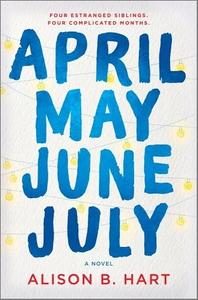
 It's impossible to read Alison B. Hart's April May June July and not think of what Tolstoy wrote about unhappy families: they are all unhappy in their own ways. In Hart's beautifully crafted novel, the "Barber sadness" is a particular unhappiness born in tragedy: the disappearance of patriarch Frank Barber after he and three Iraqi associates were kidnapped in Iraq, where he worked as a civilian contractor.
It's impossible to read Alison B. Hart's April May June July and not think of what Tolstoy wrote about unhappy families: they are all unhappy in their own ways. In Hart's beautifully crafted novel, the "Barber sadness" is a particular unhappiness born in tragedy: the disappearance of patriarch Frank Barber after he and three Iraqi associates were kidnapped in Iraq, where he worked as a civilian contractor.
Ten years after the kidnapping, "the length of his absence was its own sort of answer to the question any news?" And yet his four children--April, May, June, and July--are unable to put aside hope that he may someday reappear, a hope that soaks into their unhappiness as adults, "the way hope felt indistinguishable from despair." April throws herself into work and raising her children, but with a side of extramarital affairs. May disappears into herself, pulling away from friends and family alike. June remakes herself as Juniper, a star soccer player and rising coach, but struggles with alcohol. And July, the youngest and only son, tries to find his footing in college and his unrequited feelings for his roommate.
When the four estranged siblings are thrown back together in a series of celebratory events leading up to Juniper's wedding, the "contrails of tragedy" follow them into every encounter. And when April thinks she spots her father on a vacation in Dubrovnik, of all places, every hope--for Frank's life, yes, but even just for answers to the questions surrounding his disappearance--comes rushing back to the surface of their lives.
In her acknowledgements, Hart (The Work Wife) notes that a kernel of this novel came from her desire to understand more about the recent history of Iraq, "a place that's been in the headlines throughout my life... but that I felt I understood only opaquely." This weaves through the threads of the Barber siblings' lives, each indelibly shaped by the politics of the United States' involvement in Iraq, despite living thousands of miles away. Hart invites readers to grapple with an understanding of the larger geopolitical forces at play ("the realization that your life of relative safety was purchased through violence"), even as the Barber siblings deal with their own individual grief, hope, and desperate search for answers. April May June July is part family saga, part missing persons case, part political thriller; a captivating and important novel that reveals just how personal the political is--and vice versa. --Kerry McHugh, freelance writer
Shelf Talker: April May June July is part family saga, part missing persons case, part political thriller, a captivating and important novel revealing just how personal the political is--and vice versa.

